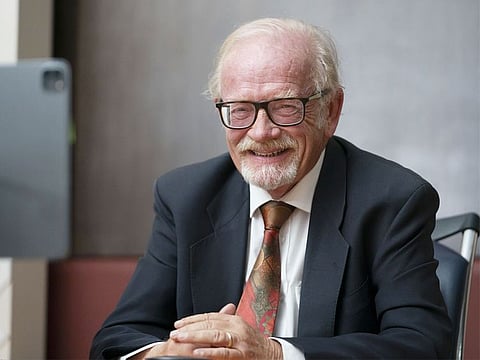Peter Hellyer: A man who proved that East and West could meet
He touched upon diverse aspects of the UAE, ranging from geography to poetry and beyond

Peter Hellyer, the chronicler of the UAE who passed away earlier this week, epitomised what cultural anthropologists would call liminality; ‘a space of in-betweenness, existing between and across boundaries’.
In Peter’s case, his liminality operated at two levels; as an Englishman who made the UAE his home and revelled in the cultural richness of both and as a passionate scholar who effortlessly moved across the borders of archaeology, history, environmental studies, and journalism.
This spirit of welcome transgression across borders marked his life, and those of us who have had the opportunity to interact with the man closely learnt much from him. We also felt nourished by his avuncular warmth and camaraderie, which betrayed no signs of hierarchy or impatience.
Peter’s life and works had been an eloquent repudiation of Rudyard Kipling’s notorious lines: “Oh, East is East, and West is West, and never the twain shall meet, Till Earth and Sky stand presently at God’s great Judgment Seat”.
Interestingly, in the half a century-long friendship between him and Ibrahim Al Abed, the Palestine-born Emirati whose name became synonymous with the UAE’s mediascape and who was instrumental in bringing Peter to this country, he actualised the subsequent lines in Kipling’s poem: “But there is neither East nor West, Border, nor Breed, nor Birth, When two strong men stand face to face, though they come from the ends of the earth!”.
Witnessing for years the way the two lifelong friends communicated with each other daily through mutual warmth, ideas, mischiefs, taunts, and reminiscences was as exhilarating as it was sobering.
An infectious joviality
As a friend and colleague of both for years, this writer had the pleasure and privilege of being the third man in the room when they met for coffee in the morning on most days. Peter would turn up in my office first and both of us would then saunter to Al Abed’s, where he would welcome us with infectious joviality.
The conversations ranged from light-hearted banter to international issues, from Edward Said to Adonis, and from the UAE’s history and archaeology to the Western media’s skewed reporting on the country. The two gentlemen together built the foundations on which the vast and varied media industry in the country now stands.
Peter Hellyer indefatigably pursued his diverse passions — archaeology, environment, history, ornithology — for nearly half a century, erecting in the process an edifice of knowledge on the UAE’s past, its natural wonders, and its flora and fauna. The spectacular archeological finds that were made possible thanks to his initiatives helped link the country’s current commitment to diversity, pluralism, and tolerance to the ancient past of the land.
His involvement in the excavation of the 1400-year-old monastery and church on Sir Bani Yas Island is perhaps the most notable in this regard. The momentous discovery showed that the ancestors of the UAE’s citizenry respected in their midst a diversity of belief systems and ways of life.
Author of seminal texts
The site was the first evidence of early Christianity in the region. The numerous artefacts found at the site also revealed valuable information about the lifestyle and livelihood patterns of the people at that time and their expansive trading activities across the Arabian Gulf and the Indian Ocean.
‘Is there a future for the UAE’s past, and if there is, how do we ensure it’ was an obsession Peter grappled with all his life. While he happily lived in the country’s present, he never missed an opportunity to delve deep into its multiple pasts, trying to conjure a continuum of historical experiences that validates the UAE’s present vision and value system.
A cursory look at Peter’s books, both written and edited, as well as his numerous newspaper columns, reveals the range of Emirati issues that he dealt with. “Archaeology of the United Arab Emirates”, a book Peter co-edited, is still considered one of the seminal texts for the study of the region’s past.
“United Arab Emirates: A New Perspective”, a book that Ibrahim Al Abed and Peter Hellyer jointly edited, is another unique volume that brings together several academic papers on diverse aspects of the UAE, ranging from geography and geology to poetry and the environment.
In the book, published in 1997, Peter himself wrote an incisive essay on the origin and evolution of the UAE’s foreign policy, focusing specifically on the determinants of continuity and consistency in the country’s relationship with the world outside. “Waves of Time: The Maritime History of the United Arab Emirates” is a monograph that he authored, telling the story of the country’s marine heritage and the profound linkages of its people to the sea. “Fujairah: An Arabian Jewel” is a succinct account of the Emirate’s history and heritage, its growing economy, and its hospitable people.
Shajahan Madampat is a writer and cultural critic from India based in Abu Dhabi.


